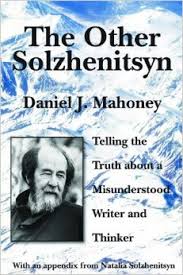In Joseph Frank's Lectures, we are taught how to read well, think well, and, as for all grand endeavors, to live with eschatological apprehension.
Telling the Truth about Aleksandr Solzhenitsyn
Comes now the great Daniel J. Mahoney, author of penetrating intellectual biographies of Bertrand de Jouvenel, Raymond Aron, and Charles de Gaulle, among other books, to discuss his latest work, The Other Solzhenitsyn. Mahoney, coeditor of The Solzhenitsyn Reader, offers in this discussion a tremendous introduction to the Russian dissident writer’s oeuvre and a rebuttal to his many critics.
We might say that some Western writers who, from their position of faux outrage, frequently critique their governments, societies, and cultures have Solzhenitsyn envy, earnestly wishing their work had even a fraction of the impact of the Russian anticommunist’s corpus of writings. Not that they admire Solzhenitsyn’s political or moral philosophy, or his belief that freedom is ultimately born of spiritual commitment. They only yearn to have it said that their words put a “sliver in the throat of power.” Such was the praise given Solzhenitsyn in 1962 after the publication of One Day in the Live of Ivan Denisovich.
If that short account of prison life was a sliver, The Gulag Archipelago represents the single most consequential writing delegitimizing Soviet communism. This “experiment in literary investigation” reports on Solzhenitsyn’s eight years in Soviet prison camps, recalling the sufferings of the zeks and the lies of the regime, knowingly accepted by its apparatchiks, lies required to keep the entire illegitimate enterprise afloat. Mahoney quotes the Swiss scholar Georges Nivat’s observation that in this work, Solzhenitsyn is “the Homer of the subterranean world inhabited by the zeks, a world of camps, repression and death, but also of spiritual renewal that he famously named ‘the gulag archipelago.’”
Yet, Solzhenitsyn’s person and his work have been attacked and misrepresented. Are the accounts of Solzhenitsyn as anti-democratic, theocratic, and pro-Putin, to name a few, accurate? Do they reveal something his admirers have missed? Or is it the case that many Western writers fail to understand the nature of Solzhenitsyn’s critique of both communism and the materialism and unbounded freedom of late-modern Western democracies, to say nothing of their understanding of the Russian nation and culture, and the type of political freedom that Solzhenitsyn advocated after Soviet communism fell? Mahoney’s discussion of these questions and ideas is fascinating.
Some might wonder why we need to listen to the words of Solzhenitsyn given that the Union of Soviet Socialist Republics is defunct. It is because we have been unable to deal with the monstrous legacy of communism. We have fallen short, as Solzhenitsyn himself said, and we need to explore why. His reasoning that communism was the fulfillment of philosophical modernity surely merits consideration in the matter of our diffidence in confronting communism’s record of death and destruction.



